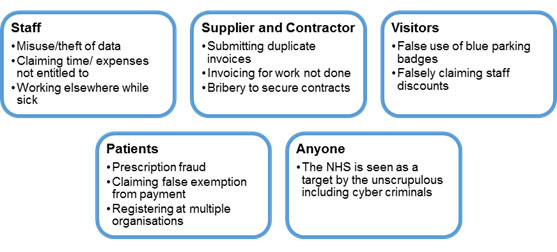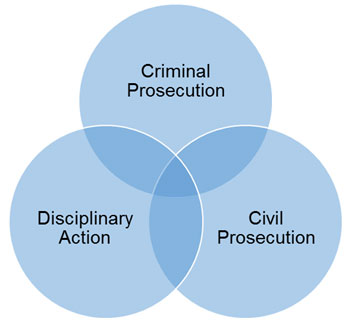Welcome to the Counter Fraud, Bribery and Corruption section which contains important information, guidance and advice for countering fraud, bribery and corruption in the NHS. We all know that the majority of people who work in and use the NHS are honest, but a minority will seek to defraud it. It’s important that we are all aware of the types of fraud that are committed and are not afraid to report fraudulent behaviour.
One of the basic principles of the NHS is the proper use of public funds. It is therefore important that all staff working in the public sector are aware of the risk of fraud, bribery, corruption, theft, and other illegal acts involving dishonesty.Whether you are an NHS employee, contractor, supplier of goods and services or a member of the public, your input is crucial to help us tackle fraud and corruption in the health service. Anyone can report concerns about fraud in the NHS.
Do you know what fraud is?
Fraud is wrongful or criminal deception intended to result in financial or personal gain.
Why is fraud an issue for the NHS?
Fraud costs the tax payer billions of pounds each year. The NHS share of this is likely to run into at least hundreds of millions of pounds. As we all know the NHS is in financial difficulty, saving money lost through fraud is important as it is money that can be used for patient services and staff costs.
How can we stop fraud in the NHS?
Everyone working in the NHS has a role to play to stop fraud, for example by remaining vigilant, following agreed upon procedures and raising concerns. Local Counter Fraud Specialists work within the NHS to prevent, detect and investigate fraud.
How might fraud in the NHS look?
Below are some examples of the types of fraud committed against the NHS:

What can we do about fraud?
The NHS has a zero-tolerance approach to fraud. Three courses of action are considered where a fraud is found. Any one of these, or a combination of them, can be used.

Bribery and Corruption
Fraud is not the only threat to the NHS. Bribery and corruption is also a key concern. It is illegal to pay, offer, take or ask for a bribe.
The risk of bribery is more common in some roles than others. For example, staff in a procurement team might be offered bribes when large contracts are being awarded.
The NHS takes bribery very seriously. If you feel someone is trying to unduly influence you or your decisions, please treat it in the same way as a suspected fraud.
The Bribery Act 2010 – Statement from the Trust’s Chief Executive
‘The Bribery Act 2010 (the Act) came into force on 1 July 2011.
It aims to tackle bribery and corruption in both the private and public sectors, including the NHS. The Act replaced the Public Bodies Corrupt Practices Act 1889, the Prevention of Corruption Acts of 1906 and 1916 and the common law offence of bribery – and provides an updated framework of offences making it easier to tackle bribery.
There are three offences that could be applied to the NHS and, therefore, to this organisation:
- Offering, promising or giving a financial or other advantage (a bribe) to another person in order to get that person to perform an official function or activity improperly.
- Requesting, agreeing to receive or accepting a financial or other advantage (a bribe) in order to perform an official function or activity improperly.
- Failure of an organisation to prevent bribery. This means that the Trust can be convicted of a corporate offence if it fails to show that it has adequate procedures in place to prevent bribery taking place.
I would urge everyone connected with our organisation to conduct our business fairly, honestly and openly at all times to ensure that our actions remain lawful.
The Government has stated that the Act is not intended to prohibit genuine hospitality that is reasonable and proportionate in the conduct of an organisations business. This organisation, as well as the rest of the NHS, has specific rules regarding the receipt of hospitality, gifts and sponsorship and these are contained within the Trust’s Standards of Business Conduct Policy (which can be located on the Trust’s SharePoint) and I would remind all staff to comply with the rules contained within the Standards of Business Conduct Policy at all times in relation to hospitality, gifts, sponsorship, outside / secondary employment, etc.
United Lincolnshire Hospitals NHS Trust welcomed the introduction of the Bribery Act in 2011 and, on behalf of the Trust, I confirm our continuing commitment to ensuring that our organisation is free of bribery and corruption.
Finally, if you do have any concerns regarding bribery at the Trust please contact the Trust’s Local Counter Fraud Specialist or alternatively, telephone the national NHS Fraud and Corruption Reporting Line on 0800 028 40 60 or go online at www.cfa.nhs.uk/reportfraud
